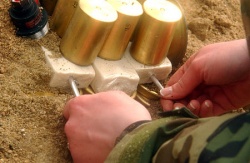Difference between revisions of "C-4"
(expand the lede and add about the school bus) |
|||
| Line 3: | Line 3: | ||
|image=c4.jpg | |image=c4.jpg | ||
|image_caption=Inserting [[blasting cap]]s into blocks of C-4 explosive | |image_caption=Inserting [[blasting cap]]s into blocks of C-4 explosive | ||
| − | |constitutes=explosive | + | |constitutes=plastic explosive |
|description=The most powerful non-nuclear explosive, supposedly very tightly controlled. However, in 1982 a log time CIA operative exported 20 tons, almost the entire US domestic stockpile, to Libya, and trained [[Muammar Gaddafi]]'s forces how to use it for bomb making. | |description=The most powerful non-nuclear explosive, supposedly very tightly controlled. However, in 1982 a log time CIA operative exported 20 tons, almost the entire US domestic stockpile, to Libya, and trained [[Muammar Gaddafi]]'s forces how to use it for bomb making. | ||
}} | }} | ||
| − | 2 pounds is sufficient to destroy a jet plane.<ref>http://www.fromthewilderness.com/free/ciadrugs/Ed_Wilson_1.html</ref> | + | '''C-4''' is an exceptionally powerful explosive. It has the consistency of modelling clay, so can be easily shaped by hand as desired, assisting concealment in far corners or inside other objects. It is also one of the most brisant (i.e. difficult to detonate) of the conventional explosives, so is used with a [[detonation cord]] (generally made from [[PETN]]). 2 pounds is sufficient to destroy a jet plane.<ref>http://www.fromthewilderness.com/free/ciadrugs/Ed_Wilson_1.html</ref> |
==Distribution to terrorists== | ==Distribution to terrorists== | ||
Revision as of 07:42, 26 August 2016
(plastic explosive) | |
|---|---|
 Inserting blasting caps into blocks of C-4 explosive | |
| The most powerful non-nuclear explosive, supposedly very tightly controlled. However, in 1982 a log time CIA operative exported 20 tons, almost the entire US domestic stockpile, to Libya, and trained Muammar Gaddafi's forces how to use it for bomb making. |
C-4 is an exceptionally powerful explosive. It has the consistency of modelling clay, so can be easily shaped by hand as desired, assisting concealment in far corners or inside other objects. It is also one of the most brisant (i.e. difficult to detonate) of the conventional explosives, so is used with a detonation cord (generally made from PETN). 2 pounds is sufficient to destroy a jet plane.[1]
Distribution to terrorists
In the Arms for Libya weapons deal, CIA operative Edwin P. Wilson shipped 20 tonnes of C-4 to Libya in 1982, and provided training in bomb making. This was actually with the full knowledge of the CIA - although they initially denied this when his case came to trial, Wilson was vindicated almost 20 years later when internal paperwork surfaced which proved that the Charles A. Briggs, the Inspector General of the Central Intelligence Agency had perjured himself to ensure the convistion.[2]
Use
The initial story of 7/7 suggested that C-4 was used, but this was swiftly changed.[3]
C-4 was used for the 1972 Peteano Bombing and for many of the bombings carried out by Operation Gladio operatives in Italy.[citation needed]
By CIA
In 2016, the Washington Post reported that a routine check had spotted "putty-type" explosive material hidden under the hood of a US school bus. The CIA stated had been accidentally left there after a anti-terrorism training exercise a week before. They added that the material was "incredibly stable" and so "the students on the bus were not in any danger from the training material".[4]
An example
| Page name | Description |
|---|---|
| Semtex |
- ↑ http://www.fromthewilderness.com/free/ciadrugs/Ed_Wilson_1.html
- ↑ http://www.unwelcomeguests.net/718
- ↑ http://terroronthetube.co.uk/inquest-articles/77-what-went-bang/
- ↑ https://www.washingtonpost.com/local/public-safety/cia-left-explosive-material-on-loudoun-school-bus-after-training-exercise/2016/03/31/428f9824-f78d-11e5-a3ce-f06b5ba21f33_story.html